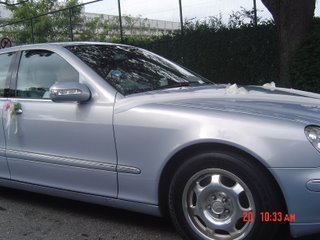Feeling sick again
feeling better tis morning but feels like shit now.
the aching is coming back and i seriously tink i'm coming dwn wif something...so gross.
shall work from home tomolo...hate being sick!
*welcometolivia'srealm*thisblogisabtliviaandeverythinglivia*welcometolivia'srealm*thisblogisabtliviaandeverythinglivia*welcometolivia'srealm*thisblogisabtliviaandeverythinglivia*







September 18, 2006
BEIJING -- Wal-Mart Stores Inc., the world's largest retailer in terms of sales, announced the launch of its first credit card in China in conjunction with Bank of Communications, a major Chinese bank.
The venture is likely the first credit card issued by a foreign retailer, analysts say. It marks a milestone in China's evolving consumer market, where less than 5% of the population have credit cards, according to industry estimates.
The Bank of Communications Pacific Wal-Mart credit card marks "a completely new cooperation between the finance and retail industry," the bank said.
The card will initially be launched in six Wal-Mart stores in Shanghai, Nanjing and Fuzhou, and "soon spread over the country," said a bank official.
Wal-Mart officials in China said the card is a regular credit card that can be used anywhere, but that will provide users special discounts at its stores. It will be a dual-currency card that can also be used anywhere outside China.
In June, media reports said the Bentonville, Arkansas, company had been close to issuing a credit card with another Chinese bank. A Wal-Mart spokesman in China didn't rule out other credit-card announcements and said the company, which has about 60 stores in China, "will continue to introduce new services that can add benefits to the customers."
The Bank of Communications' credit-card unit is jointly run with HSBC Holdings PLC, which owns a 20% stake in Bank of Communications. In recent years, foreign banks have begun forming joint ventures with local banks to issue dual-currency credit cards, but none are profitable so far, analysts say.
"China's credit-card market is growing very fast and is beyond infancy stage now," said MasterCard International economist Yuwa Hedrick-Wong.
McKinsey & Co., estimates that credit-card profits in China could hit $1.6 billion by 2013.
January 12, 2007
BEIJING -- Air China will continue to be the nation's strongest carrier this year as the other two major players, China Eastern and China Southern, struggle to reverse losses in a market set to become increasingly competitive with the arrival of more low cost and regional carriers, analysts said.
The battle for market share is likely to be fought on different fronts, with newly introduced budget airlines looking to gain a foothold on niche routes, while the state-owned "big three" look to make more efficient use of their hub and spoke systems.
Guotai Junan analyst Alan Lam added that all carriers will be keeping an eye on the price of jet fuel, which dogged airlines worldwide in recent years but has fallen back in the past few months.
In China the price of jet fuel is fixed by the state, and although the ex-refinery price was reduced by 180 yuan to 6,020 yuan per ton from January 1, fuel costs will still make up a high proportion of airlines' expenses.
Of the "big three" carriers, Air China will enjoy continued growth after consistently outperforming its two main rivals, thanks to its extensive international network and strong Beijing hub, which will see growing traffic numbers in the run up to the Olympics next year, Lam said.
"Air China will still outperform the market. It is the most profitable airline in China, and this trend will continue in 2007 and especially 2008," he told XFN-Asia.
The flag carrier announced that it carried 31.49 mln passengers in 2006, an increase of 13.7 pct from a year earlier.
The airline is already reaping the benefits from its tie-up with Cathay Pacific, with increased traffic on routes between Hong Kong and the mainland. Air China said its passenger load factor on Hong Kong and Macau routes rose to 70.2 pct in 2006 from 64.9 pct in 2005.
"Air China's alliance with Dragonair and Cathay Pacific is already showing positive effects, and we believe this situation will continue in 2007 and 2008," Lam said.
The carrier will also benefit from China's open sky policy, which will give it access to new international markets, he added.
"It is clearly the major beneficiary of the open skies policy, especially for international routes. Although more airline companies will be entering China, it is a bilateral policy so other countries also need to open their skies to China," he said, adding that Air China will have the opportunity to further explore both the US and European markets.
As for closer alliances among other airlines, there is speculation that Singapore Airlines will take a strategic 20 pct stake in China Eastern this year.
This would be a boost to China Eastern, which suffered heavy losses last year, but such a deal is unlikely to be as fruitful as Air China's cooperation with Cathay, not least because the route between Shanghai and Singapore is less significant than between Beijing and Hong Kong, Lam said.
"It would have some positive effect, but questions remain if this kind of strategy can be as effective as the cooperation between Air China and Cathay," he said.
With Hong Kong being a major hub in the Asia Pacific -- and a hub that is close to mainland China - it can expect much more traffic than the long haul Shanghai to Singapore link.
"It will be difficult for airline companies to duplicate the successful model of Air China," Lam said.
Morgan Stanley analyst Edward Xu agreed that the potential investment would prove beneficial for China Eastern in terms of providing more capital, but to a far lesser extent than the relationship between Air China and Cathay.
"The synergies between Singapore Airlines and China Eastern might not be as significant...they do not have so many duplicated routes, whereas Cathay and Air China both have large volumes between Hong Kong and the mainland," Xu said.
"Also, unlike Air China and Cathay, Singapore Airlines and China Eastern do not have cross shareholdings," he added.
For 2006, China Eastern's figures are destined to remain firmly in the red after it posted a loss of 970.2 mln yuan in the first three quarters of the year.
"I expect the fourth quarter to also be lossmaking, which will exacerbate the airline's problems. It will remain in the red for 2006," Morgan Stanley's Xu said.
The carrier struggled on heightened competition and surging fuel costs, and although jet fuel prices have dropped from last year's highs, there will be no let-up in competition on key routes, not least from Air China which plans to expand its operations in Shanghai, China Eastern's base.
China Southern also faces problems.
The Guangzhou-based carrier last year carried 49.2 mln passengers, an increase of 11.5 pct from a year earlier, but its strong performance in the latter part of the year was weighed down by a loss of almost one bln yuan in the first half.
The company's parent is undergoing share reform, but financial difficulties have slowed the process. This does not bode well for China Southern ahead of its massive capital expansion plans for 2008 to 2010, when it will take delivery of 50 aircraft from Airbus with a catalog value of around 3.32 bln usd.
"China Southern cannot progress with its share reform plan...under the circumstances, it is unlikely foreign investors will buy a stake in the airline," Lam said.
"China Southern has a huge capital expansion plan for 2008 to 2010. Its gearing level will surge dramatically," he added.
China Southern could benefit though from government plans to promote internal routes, particularly to the poorer, western regions of the country, as it is the most domestically concentrated of the big three airlines.
The carrier has the potential to further carve out niche routes with its acquisition of Xinjiang Airlines improving its network in the less competitive western region, from where it can also serve Russia and other Central Asian countries.
It is actively expanding its international network, most recently opening a route to the Nigerian capital Lagos, but Xu warned that long-haul routes are not likely to be very profitable.
"Long-haul international routes are not very profitable, yields are usually pretty low. Also, for Chinese airlines, the customer base is not so good as they do not get so many high quality business travelers," Xu said.
This is especially true for China Southern, as many business travelers near its Guangzhou base fly out of Hong Kong, while there are also many smaller airports in nearby boom towns like Shenzhen and Zhuhai.
The airline has established a second hub in Beijing, but it may take around another 12 months to develop fully, Xu said.
"The two most important hubs on the mainland are Beijing and Shanghai. Beijing especially is very attractive for most airlines as it has high yield levels from the many officials and business travelers that use it," Xu said.
According to an American Express business travel survey, corporations in China spent 7.41 bln usd on air travel in 2005, making China the fourth-largest business travel market in the world.
Where the big three airlines are similar is their shared experience of state ownership, which has both benefits and limitations.
"The state shareholding is a double-edged sword for the big three," said an independent analyst who asked not to be named.
"On the one hand, they enjoy lots of host benefits in their three major hubs, while their affiliation with the General Administration of Civil Aviation of China means the regulator is always very supportive, for example in approving new routes," he said.
"But on the other hand, tariffs are tightly regulated and they cannot easily raise fares for high margin routes, and instead are under pressure to open new routes that are not economically justified," he added.
The carriers are also almost obliged to take on new aircraft orders made by the government, not necessarily prudently, the analyst said.
"My gut feeling is that the Chinese government makes orders without looking into the real needs. Most of these order will be absorbed by the big three as part of their 'national service'," he told XFN-Asia.
Morgan Stanley's Xu said that China is expected to take delivery of 155 new jets this year.
Many of these are likely to be single-aisle aircraft for use on regional routes, where competition is heating up among low cost and regional carriers clamoring to gain a foothold in the market.
But these carriers face enormous challenges. Rising disposable incomes in China will increase demand for air travel, but the main markets will still be Beijing, Shanghai and Guangzhou, where the big three have established bases that smaller carrier will struggle to penetrate.
The ability of budget airlines to offer sharply discounted fares is also restricted, as proven by Spring Airlines, which was last month fined 150,000 yuan by a local price regulator in Shandong province for offering air tickets at prices lower than government-set levels.
"I do not expect the new entrants to the market to make the sort of material impact they have in the US, Europe or Malaysia," said the analyst who asked not to be named.
"In Western countries, budget airlines' success is built upon a fair regulatory system and financially weak big players who always have substantial pension and fixed cost burdens.
The big Chinese airlines have very inefficient cost structures but they have a growing market and easy access to capital to withstand competition and overcome market volatility," he said.
Morgan Stanley's Xu noted that the best way for low cost carriers to survive is to focus on key routes.
"Low cost carriers are based on almost the same cost structure as the big three...for them to succeed and make money, they need to focus on very key, attractive, smaller tourism routes and keep high load factors or else they will be facing very high cost pressure," Xu said.
Guotai Junan's Lam added that more companies are likely to enter the market before a consolidation occurs.
"At the moment we are at the start of the line, not the merger and acquisition stage. That may happen after the Olympics, when the market realizes there are too many carriers and when demand may drop," he said.
(1 usd = 7.8 yuan)
nice to hear tat joc & richard's company is in the black again.
Monday January 29, 9:16 PM
tis was when i went to fetch HQ & LJ back from their eastern europe trip.
their flight was delayed for more den an hr.
at 1638hrs, their flight was still confirmed to arrive at 1638hrs
at 1641hrs, their flight was still confirmed to arrive at 1638hrs....hmmm....
at 1644hrs, their flight from istanbul has finally landed! yea! my wait is finally over
the crowd waiting for their luggage at the same belt long before the gers appear
LJ waiting for luggage.
she gestured to mi excitedly to call her hp coz kym ng was on the same flight as them.
Tue Jan 23, 3:26 PM ET
SYDNEY, Australia - A diver escaped a 10-foot shark's attack by poking the animal in its eye after it had already chomped on his head once and was preparing for another bite, witnesses and officials said Tuesday.
Eric Nerhus, 41, was flown to a hospital with serious injuries to his head, body and left arm after the attack Tuesday off Cape Howe, about 250 miles south of Sydney.
The shark grabbed Nerhus by the head, crushing his face mask and breaking his nose, said Dennis Luobikis, a fellow diver who witnessed the attack.
"He was actually bitten by the head down — the shark swallowed his head," Luobikis said.
The shark, believed to be a great white, came back for a second bite, clenching its jaws around Nerhus' torso and leaving deep lacerations in his side, said Luobikis.
Nerhus wrestled free of the shark's jaws, and later told rescue workers he had poked the shark in the eye, an unidentified worker from the Snowy Hydro Rescue Helicopter service told local media.
Nerhus was pulled from the water by his 25-year-old son and rushed to a hospital, suffering blood loss and shock.
"Eric is a tough boy. He's super fit," said Luobikis. "But I would say that would test anyone's resolve, being a fish lunch."
Shark attacks are relatively common in Australian waters, home to some of the world's deadliest sea life. Scientists say there are an average of 15 shark attacks a year in Australia — one of the highest rates in the world — and just over 1 per year are fatal.











my seat got good view sia coz we were rite behind the couple.
as they did the second march in.
first match in was wif flower gers, holding flowers.
the little flower boy was sprinkling flower petals...hehe....simply adorable


How do you deal with potentially explosive situations?
Where tempers are beginning to flare, tensions are steadily escalating, and sufficient buttons have been pushed?
What happens with many people is that they remain in the situation, either hoping to talk things over calmly or to make their point emphatically clear.
But this can only work if the other party is willing to collaborate.
But sometimes, the other party can be willfully difficult. They can be persons who get off on pushing your hot buttons.
What happens then? A likely scenario is that like a fish to the bait, you continue to engage in the conversation, the other party continues to gall you, and *snap!*, the last straw breaks your back.
At this point, when self-control is lost, you may utter threats, make scathing remarks, or throw pot-shots that you immediately regret.
In a social setting, you may end up looking rash and petty.
In a business or corporate setting, you may appear to be antagonistic and hot-tempered.
In a personal context, you may end up really hurting a loved one.
In the long term, angry outbursts will sour any relationship.
If you find yourself quite unintentionally getting yourself into potentially-explosive situations, how can you avoid actually exploding?
Well, you can walk away.
A seemingly simple thing to do, but something that can be extremely difficult to do in practice, especially when you feel you've been grossly misunderstood. You'd want to stake it out and explain yourself until the other person gets it, right?
That's what keeps you there.
That's what makes you reiterate your arguments again and again until they begin to sound meaningless.
In these instances, you're at the losing end; it's simply more sensible to walk away.
Do you have the power to walk away from potentially-explosive situations?
Are you able to postpone defending yourself to another more appropriate time?
Can you conserve your cool and avoid saying or doing something you'll regret later?
Because when you care too much about winning in such situations, you lose.
You're the one who feels the pressure, you're the one who seems antagonistic and defensive.
It will be hard initially, but practice walking away and you'll understand just how powerful it can be in defusing explosive situations and even persuade others to see things your way.

it was too overcast for a 'proper' sunrise so the sky juz kinda got brighter gradually.




